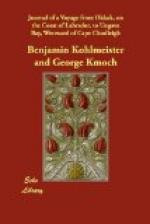Brother Kohlmeister visited the people in their tents. They were about fifty in number, men, women, and children. He informed them, that nothing could induce the Missionaries to come into this country, but love to the poor heathen, and an ardent desire to make them acquainted with their Creator and Redeemer, that through Him they might attain to happiness in time and eternity. Some seemed to listen with great attention, but the greater part understood nothing of what was said. This, of course, did not surprise us, as most of them were quite ignorant heathen, who had never before seen an European. They, however, raised a shout of joy, when we informed them, that we would come and visit them in their own country. Many were not satisfied with viewing us on every side with marks of great astonishment, but came close up to us, and pawed us all over. At taking leave we presented them with a few trifles, which excited among them the greatest pleasure and thankfulness.
We recommend these heathen to the mercy of God, and pray, that the day may soon dawn, when the light of the saving gospel of Jesus may shine into their hearts.
3d. Several of them came on board, once more to see us, and, in their way, to express their regard and gratitude. They also got some useful articles from our people, in exchange for their goods. We now set sail, passed a point called Oglarvik, and the bay Takpangayok, and arrived at Tuktusiovik, (a place where reindeer are seen), where we cast anchor for the night. Already at Omanek we had discovered a great difference between the rise and fall of the tides there and about Killinek. In the latter place it rose to four fathoms, but here still higher. The country looked pleasant, with many berry-bearing plants and bushes. There was, likewise, plenty of drift-wood all along the coast; not the large Greenland timber, but small trees and roots, evidently carried out of the great rivers of the Ungava by the ice. We had, of course, fire-wood enough, without robbing the graves of their superstitious furniture. Our Esquimaux pitched their tent on shore, and we supped with them on a mess of seal’s flesh and eider-ducks. The musquitoes were extremely troublesome during our repast, after which we retired to sleep on board the boat.
4th. Wind fair. We passed numerous low rocks; a point, by name unknown to Uttakiyok; the bay Ikpigitok, two miles broad, and the cape called Uibvaksoak, the northern boundary of the great bay or gulf of Abloriak. This cape is surrounded by many bare and sunken rocks, which caused us to stand out pretty far to the westward. While we were off the point, we descried, at a very great distance to the N.W. a large island, called by the Esquimaux Akpatok. They say, that it encloses the whole bay or gulf towards the sea, and consists of high land: also, that it is connected with the western continent at low water by an isthmus. The north coast of this island appears to be the line laid down in maps and charts as the coast of America, to the south of Hudson’s Straits. But the district of Ungava is separated from the island by a large inland bay, extending southward to the 58 deg. N.L. North of Akpatok, the Esquimaux speak of islands well peopled by their countrymen, who have never seen Europeans.




